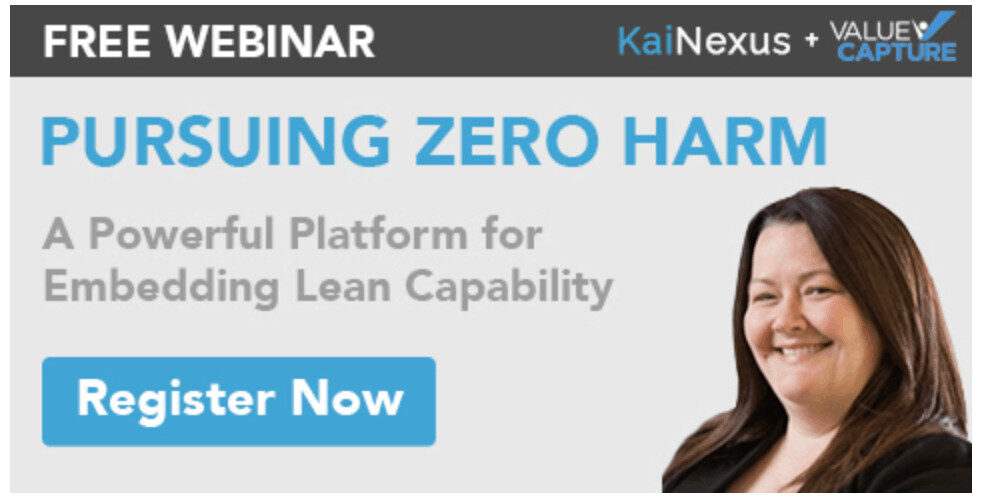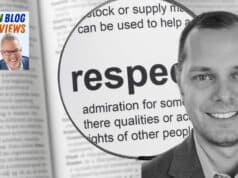I'm very happy that my friend and long-time colleague Meghan Scanlon, a Principal with the firm Value Capture, presented a webinar that KaiNexus and I be hosted on February 27th:
Pursuing Zero Harm: A Powerful Platform for Embedding Lean Capability
Click here to register to view the slides (it's free).

The firm Value Capture was founded by the amazing Paul O'Neill (listen to my podcast with him about leadership and patient safety from a few years back). Mr. O'Neill was the CEO of Alcoa and made employee safety the primary aim and focus… which created “habitual excellence” and better performance in every dimension, including the stock price. Employee harm went down, stock price went up. Mr. O'Neill has been a leader in trying to bring these mindsets and principles into healthcare. One of those ways is the work Value Capture does in healthcare.
Disclosure: I sometimes work as a senior advisor with Value Capture.
Meghan is well suited to give this talk, given her 15 years of experience in healthcare improvement. Meghan and I worked together when I was part of the team at Johnson & Johnson's ValuMetrix Services consulting group. I'm excited that she has the time to do this.
This webinar will be of value to people in any industry — using employee safety and/or patient safety as a rallying cry for improvement.
We recorded a short podcast discussion for the KaiNexus podcast series, with audio and a transcript following below in this post.
Preview Podcast Audio:
Webinar Recording:
Preview Podcast Transcript:
Mark Graban: Hi, this is Mark Graban from KaiNexus. Today, we're joined by Meghan Scanlon. We're going to be previewing the webinar she's going to be presenting on February 27th at one o'clock Eastern. The title of the webinar is “Pursuing Zero Harm, A Powerful Platform for Embedding Lean Capability.”
You can register for that by going to www.kainexus.com/webinars.
Meghan, thank you for joining us today. How are you?
Meghan Scanlon: Well, thanks, Mark. Thanks for having me.
Mark: Sure thing. Thank you in advance for doing the webinar. Let's take advantage of the opportunity to have you introduce yourself and tell the listeners a little bit more about you and your background than we'll get into during the webinar.
Meghan: Absolutely, thanks. My name is Meghan Scanlon. I work for Value Capture. We are a healthcare-based firm out of Pittsburgh, Pennsylvania, who is influenced by one of our founding members, Paul O'Neill, who was the former CEO of ALCOA and Secretary of Treasury under George W. Bush.
Our passion comes from the influence of safety and the power of safety as a transformational platform in an organization that's focused on being the best they can be at what they do. My personal background is that I'm a industrial engineer.
Straight from university, I went to the Johnson and Johnson company, where I was fortunate to work in their manufacturing areas, where we applied lean principles and were working on delivering new value to customers, and Lean / TPS type principles in our own processes.
Through that journey, I was able to join a group that, then, took the principles that we had been instilling and infusing in our own manufacturing to the end users of our products. Through that,
We worked to help the end users of our products with the use of those products but not just the products themselves. Also, just in their spaces of clinical medicine, laboratory medicine, pathology. More of a value stream-based approach to that improvement work.
Over time, I got interested in not just thinking about the more local improvements and how you can transform and engage people and see drastic improvements in how they work, but thinking about, in a larger way, the strategy.
How you do this in more of an organizational level to really have some sustaining, long-term improvements, and drive that culture of improvement in a values-based way, which is what attracted me to Value Capture and what I've been working to do with them over the past five years.
It's been really exciting to learn about that strategic organizational journey and path to improvement that's needed, especially engaging those to level leaders. Thinking about how to do it with safety as the precursor to excellence, I think, is really exciting and important.
Mark: You've touched on this, but lean and this idea of safety as a driving force is something that applies across multiple industries. Could you talk a little bit more about that?
Meghan: Absolutely. Something that's key in thinking about organizational strategy is how you tap into hearts and minds. To me, hearts and minds are universal because it's people.
We work in all different kinds of industries, so I think that this idea of safety and putting worker safety specifically first is a really important concept, especially in an industry like health care. Not to go back to that, but I think that patient safety often gets top billing in health care.
Recently, people are starting to find more value in the idea that we can't be the best we can be for our patients if we, ourselves, are experiencing harm or suffering from harm.
It's just one of those universal ideas that transcend industries and is something that everybody can relate to and can rally around because no one should ever go to work and be hurt or harmed. If we can't get home in the same condition that we arrived to work, then that's a real problem that's worth focusing on.
Mark: That sounds like a good example when you talk about values based. That's a values-based principle, that nobody should get hurt at work.
Safety, we focus a lot on physical safety but there's also concepts of psychological safety and professional safety that are important, as well, right?
Meghan: Absolutely. Value Capture, one of the things that we thing about is how we define safety. We tend to do it in three different ways, like you just highlighted. The physical safety is typically very intuitive, but when we talk about emotional safety or harm, which is people's willingness to accept blame for problems.
Oftentimes, when a problem occurs and someone feels like they did something wrong, that whole idea of, “My bad. Sorry, guys. My fault. I didn't mean for that to happen.” That's something that people instinctively do.
That is what we talk about as emotional harm, is saying that takes away the organization's opportunity to learn from what happened that might have led to that problem. We shouldn't be so quick to accept blame as people in those situations.
Professional safety is really important and interesting, especially on a cultural level. That's the ability to be able to call out problems that exist without fear of repercussion or any kind of punitive actions being taken against you.
When we think about what that means in an organization, how willing are people to call out problems? What is the response when they do call them out? Is there a fear of having that be a career limiting move or some sort of ill effects to you? What does that do to how your organization sees problems and how they're willing to call them out and solve them?
I do think there's a lot of things that are more nuanced in the safety focus but are really important for organizations who are truly trying to be the best at what they do. There's a large cultural focus, especially leadership behaviors and what it means, either directly or indirectly, as well.
Mark: I think there's an important nuance you pointed out there and I've seen, especially in health care, where people are really caring. They're really dedicated. Even if they are not being blamed by the organization, there's that self blame that can cause harm and get in the way, like you said.
Meghan: Absolutely.
Mark: The final thing to touch on here, and this is the key theme of your webinar. If you can give a bit of a preview. The title is Pursuing Zero Harm. I was wondering if you could talk a little bit…
When you mentioned drastic improvements, we've seen organizations in different industries… Mr. O'Neill, as CEO of ALCOA. We've seen health care organizations make drastic improvements in harm and safety numbers.
Why is zero an important goal? Why is it important to talk about zero harm instead of talking about, say reducing harm?
Meghan: I think that's a great question. I think it also is part of the key in organizations that are going to be more successful in these journeys than others. That's the idea that the difference between what is a true north goal and maybe an operational, incremental goal.
The value of setting those true north goals at zero or at perfect, as we like to say, is really important because it's meant to set the organization free.
Organizations and systems produce results exactly as they're currently designed. Most organizations aren't achieving perfect safety or perfect of any of their top level metrics that they set to achieve.
This idea of setting something at perfect to really show the organization that we know we might not be capable with our current constructs or current systems as they are designed now.
It's really going to take tearing down those walls, and thinking, truly, outside the box and innovating in ways that we haven't done just yet to get to where we're trying to go, and giving permission to challenge those norms and those current constraints. Not just because it's the right thing to do, but because it's the only way we're going to get to where we want to go.
I think it's a really smart, strategic way to have leadership give permission in the organization and to throw down that challenge of, “This is where we're trying to go. Now, every day, we're going to make steps towards it.”
Another important piece of it is that it's sort of that old adage, if everything's a priority, nothing is. It's the idea that if we say zero, then any of those events is not OK, either. One is too many of any type of harm event.
If we're not saying that the number is zero, then we're actually saying that…Who's going to raise your hand to suffer harm today because we'll allow a certain amount of it? You instantly stop the momentum and the seriousness within the organization that we want this to do, to drive people towards that.
Zero is the only way to do it in the most value-based way. One is too many, so zero is all that we'll accept.
Mark: Actually, just a final question as a follow up. I believe strongly in this idea of setting the bar at zero. I've heard push back from some. I'm sure you've heard this, too, where people say, “Aren't you afraid that's going to be demoralizing if zero, strictly…If perfection isn't possible, why should we set an aim that we are likely not to achieve?”
Meghan: I do hear that question a lot. I think that it's only demoralizing if how you respond to it isn't supportive and in the spirit of we're here to learn and we want to keep working towards this. That's where I think professional safety comes into play, as well.
Things are only demoralizing when, in the moment, they're handled in a way that creates that feeling from folks. I think zero is important. It's on leadership to make sure that goal set in a way, and that there's a feeling of support and positivity around it, and the problems aren't bad events.
They're really opportunities or gifts that we're given. Opportunities to learn, and improve, and achieve our goals.
Mark: That's well said. Hopefully, everyone else is excited, like I am, to hear more about this in the webinar.
Again, our guest today has been Meghan Scanlon from Value Capture. She'll be presenting a webinar that we're hosting at KaINexus on February 27th. It's titled, again, Pursing Zero Harm, A Powerful Platform for Embedding Lean Capability.
As Meghan was saying as we were talking, I hope people from all industries will tune in and learn the valuable lessons here. Again, you can register by going online to www.kainexus.com/webinars.
Meghan, thanks again, so much for chatting today. Thanks in advance, again, for the webinar.
Meghan: Thank you, Mark. I look forward to it.
Please scroll down (or click) to post a comment. Connect with me on LinkedIn.
Let’s work together to build a culture of continuous improvement and psychological safety. If you're a leader looking to create lasting change—not just projects—I help organizations:
- Engage people at all levels in sustainable improvement
- Shift from fear of mistakes to learning from them
- Apply Lean thinking in practical, people-centered ways
Interested in coaching or a keynote talk? Let’s start a conversation.









